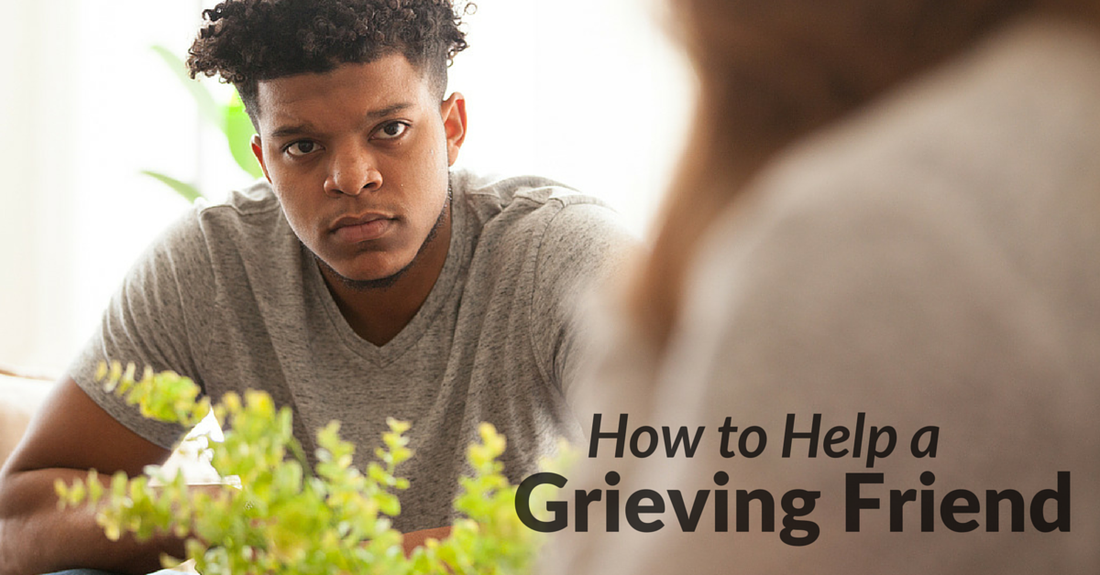|
When the news shows us another tragedy, such as the horrific events that happened at Sandy Hook Elementary School in 2012, it’s unimaginable trying to visualize what the parents and family went through. What do you say to someone who has lost a child? The best thing? Nothing. Often when we see someone going through a hard time, we feel pressured to give some sort of consolation. It’s understandable—we feel bad for the person and we want them to feel better, but many times what a grieving person needs most is not a series of platitudes or bible verses, but simply your presence. Grief is the most complex series of emotions anyone can go through. There’s sadness, anger, rage, despair, confusion and more. Grief can’t be pushed aside, ignored or softened. It has to be experienced. It has to be metabolized. Failure to do this can lead to negative long term effects. It won’t go away unless it’s dealt with. But how? Through the support of other people who care. When you’re grieving, sometimes God doesn’t seem to be there at all. God often doesn’t answer the ‘whys’ during those hard times. We too should refrain from doing so when comforting others. Just be there for them. Sit in a living room in silence with them for a few hours. Listen to them talk about the person they lost. Laugh when they laugh as they remember the good times. Help them feel less alone. They’ll thank you for it. You will be the presence of God to them during those darkest hours. For more on the topic of grief, see: Dealing with Loss
 "A friend is one who knows you and loves you just the same." —Elbert Hubbard When clients first come to see me, some of the first questions I ask are:
People grow emotionally and spiritually in the context of community and relationships. We were created to be relational beings. A lot of people who have been hurt in the past feel better closing themselves off to avoid future pain. But true wholeness is found by connecting with others. Ultimately, one must choose between risking rejection (but eventually finding connection) or remaining safe (and stuck in psychological stagnation). It seems like it's easy for children to make friends. Adults find themselves scratching their heads in situations where they are forced to interact with people they don't know. It's easy to forget some of the basic principles for making friends. How do you make friends? Dale Carnegie addressed this in his popular classic, How to Win Friends and Influence People. This is a summary of some of his most salient points on getting people to warm up to you:
These are excellent tactics because they take the pressure off yourself and help you focus on others. This is what it means to love others first. We are called to love our neighbor, even our enemies, before looking out for our own interests. Not only does this please God, but it instills immediate trust in other people. Subscribe to My Newsletter  In high school, it seems like most teens want to be popular. But what does it mean to be popular? Is everyone your friend? No. Do a lot of people know you? Yeah, in a superficial sense. This continues into adulthood, as we can often obsess over our image and likeability. Even if you achieve widespread admiration among your peers, how many people really know you? In reality, happiness is not found in achieving acclaim in the eyes of others. One huge ingredient in forming a happy life is developing deep friendships with other people. But how many people really have an inner circle of those they have completely opened up to? It wasn’t until college that I found friends that I connected to on a deep level. They knew everything about me—the good, the not so good, the downright annoying, and even the dark and sinful parts of my life. But they still loved me and accepted me. That’s true friendship. Not every friend can be a close friend. In order to have others open up to you, you have to take the risk to open up as well. Unfortunately, not everyone is capable of doing this in return. You want a circle of people around you who are also growing and maturing. Sometimes you might trust someone who turns out to be unworthy of that trust. They break promises, they refuse to see things from your point of view, they preach at you rather than listen, they spread private information about you. This is when they prove to be unsafe. It takes a discerning mind and a cautious heart, but there are people out there willing and mature enough to support you. So reach out in faith and God will bring the right people into your life. Subscribe to My Newsletter |
Article Topics
All
Archives
July 2023
|
We're ready to help. Let's begin.
Peoria LocationInside State Farm
9299 W Olive Ave Ste 212 Peoria AZ 85345 |
Phoenix LocationInside CrossRoads UMC
7901 N Central Ave Phoenix AZ 85020 |
About |
Services |
EducationPrograms
ACPE Spiritual Care Specialist Pastoral Counseling Apprenticeship Deconstruction Course Free Grief Training Contact |
We're ready to help. Let's begin.
© 2024 Prism Counseling & Coaching. All Rights Reserved.
Christian DISC® is a registered trademark of Prism Counseling & Coaching.
Christian DISC® is a registered trademark of Prism Counseling & Coaching.


